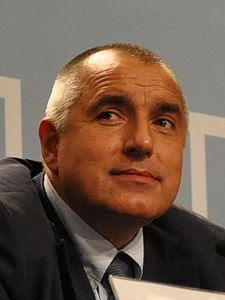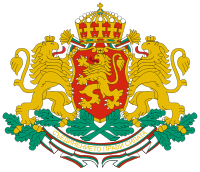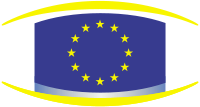Boyko Borisov
| Boyko Metodiev Borisov Бойко Методиев Борисов |
|
 |
|
|
Prime Minister of Bulgaria
|
|
| Incumbent | |
| Assumed office 27 July 2009 |
|
| President | Georgi Parvanov |
|---|---|
| Deputy | Simeon Djankov Tsvetan Tsvetanov |
| Preceded by | Sergei Stanishev |
|
Mayor of Sofia
|
|
| In office 8 November 2005 – 27 July 2009 |
|
| Preceded by | Stefan Sofiyanski |
| Succeeded by | Yordanka Fandakova |
|
Chief Secretary of the Ministry of the Interior
|
|
| In office 24 July 2001 – 8 November 2005 |
|
|
|
|
| Born | 13 June 1959 Bankya, Bulgaria |
| Political party | Citizens for European Development of Bulgaria (2006–present) |
| Other political affiliations |
National Movement Simeon II (2001-2005) |
| Spouse(s) | Stela Borisova (Divorced) |
| Domestic partner | Tsvetelina Borislavova |
| Religion | Bulgarian Orthodox Church |
Boyko Metodiev Borisov (Bulgarian: Бойко Методиев Борисов, IPA: [ˈbɔjko mɛˈtɔdiɛf boˈrisof]; born 13 June 1959) is the current Prime Minister of Bulgaria. He is a former mayor of Sofia, a post he had held from 8 November 2005 until his election as Prime Minister.
After his party, GERB, won the 2009 Bulgarian parliamentary election in early July, Borisov became Bulgaria's 50th Prime Minister[1][2] on 27 July 2009.
Contents |
Biography
Chief Secretary and Mayor of Sofia
Borisov was born in 1959 in Bankya (then a village, today a town part of greater Sofia) to Ministry of Internal Affairs official Metodi Borisov and elementary school teacher Veneta Borisova. Between 1982 and 1990, he assumed different positions in the Ministry of Internal Affairs as a firefighter and later as a professor at the Police Academy in Sofia.[3] As a National Security Office member, Borisov took part in the protection of crops and haylofts during the name-changing campaign towards ethnic Turks in the 1980s.[4] He quit the Ministry in 1990. In 1991 he founded a private security company, Ipon-1, and later guarded personalities like Todor Zhivkov and Simeon II. Borisov has been actively engaged in karate since 1980, serving as the coach of the Bulgarian national team and a referee of international matches.
Borisov is not currently married, but lives with Tsvetelina Borislavova, head of the Economic and Investment Bank. Borisov has a daughter, Veneta, from his former marriage to the physician Stela. Borisov also has a sister, Krasimira Ivanova. Borisov's great-grandfather was executed in the wake of the Bulgarian coup d'état of 1944[5].
Boyko Borisov was the Chief Secretary of the Bulgarian Ministry of Interior between 2001 and 2005, with the rank of General.[6][7][8][9][10][11] In the 2005 parliamentary elections he was candidate for member of Parliament for the National Movement Simeon II, and was elected in two regions but decided to retain his job as Chief Secretary of the Ministry. Later that year he resigned from this post, and instead participated in and won the elections for mayor of Sofia, where he replaced Stefan Sofiyanski.
Borisov founded a new political party, GERB in 2006 (in English Coat of Arms, while also being an acronym for "Grazhdani za evropeisko razvitie na Bulgariya" or "Citizens for European Development of Bulgaria"). GERB won the first Bulgarian European Parliament elections on 20 May 2007, despite a very low poll attendance and turnout of 28.6%,[12] which prompted Borisov to voice his wish for early parliamentary elections. Following a party congress in January 2010, Borisov became the official leader of GERB (of which he had been only an "informal leader"),[13] thus replacing Tsvetan Tsvetanov, who had served under Borisov at the Ministry of Internal Affairs, and later as a vice-mayor of Sofia.
Borisov has been actively participating in Karate championships since 1978. He currently has 7th dan black belt in karate and is the chairman of the Bulgarian Karate Federation. Borisov has also been a coach for the Bulgarian national karate team for many years as well as an international karate referee.
Prime Minister of Bulgaria
Borisov's party GERB also won the parliamentary election on 5 July 2009 by collecting 39.71% of the popular vote and 116 of the 240 seats in parliament.[14][15] Since 27 July 2009 Borisov has been serving as Prime Minister of Bulgaria in a minority GERB-dominated centre-right government.[1][2]
Controversy
Borisov, on 6 February 2009, speaking in Chicago, told Bulgarian expatriates that the human material and the basis of Bulgarian population at the moment include one million Roma, 700,000 Turks and 2.5 million retirees. He added that the human material that they are left with as voters and as a pool for recruiting staff is really not that big, as half a million people have left Bulgaria.[16][17][18][19] Vice-president of the Party of European Socialists, Jan Marinus Wiersma, accused Borisov of referring "to the Turks, Roma and pensioners in Bulgaria as "bad human material"", and claimed that GERB "has already crossed the invisible line between right wing populism and extremism."[20]
Borisov has denied these accusations and in turn, he has accused the Bulgarian Socialist Party of attempting to discredit him.[21] Borisov stated in a meeting with NGOs on 5 March 2009 that he intends to include representatives of the Roma ethnicity in all levels of government, including a potential minister,[22] and has reached out to offer inclusivity to Bulgaria’s ethnic Turkish population; although these measures and proposals have been seen as politically empty. [4]
Boyko Borisov has also been criticized for his style of governing, described by some as authoritarian.[23][24][25][26]
Notes
- ↑ 1.0 1.1 "Борисов ще е премиер, остана без часовник заради бас" (in Bulgarian). Dnes.bg. 2009-07-05. http://www.dnes.bg/izbori2009/2009/07/05/pyrvoto-obeshtanie-na-gerb-nov-izbiratelen-kodeks.73813. Retrieved 2009-07-07.
- ↑ 2.0 2.1 "Борисов обеща бърз кабинет и съкращения на висши чиновници" (in Bulgarian). Дневник. 2009-07-06. http://dnevnik.bg/izbori2009/parlamentarni_izbori/2009/07/06/751108_borisov_obeshta_burz_kabinet_i_sukrashteniia_na_visshi/. Retrieved 2009-07-07.
- ↑ "Бойко Борисов" (in Bulgarian). Darik News. 2007-10-27. http://dariknews.bg/view_article.php?article_id=192798. Retrieved 2009-07-07.
- ↑ 4.0 4.1 "Boiko Borissov: A general history". Sofia Echo. 2009-07-10. http://www.sofiaecho.com/2009/07/10/752482_boiko-borissov-a-general-history. Retrieved 2009-07-10.
- ↑ http://paper.standartnews.com/bg/article.php?d=2009-07-13&article=285380
- ↑ Редакционни | Обясненията за показните убийства | Пасове между съотборници - Dnevnik.bg
- ↑ България | Акциите на МВР - приказка без край - Dnevnik.bg
- ↑ Общини | Джеф Стайн не приема поканата на Бойко Борисов - Dnevnik.bg
- ↑ Общини | Бойко Борисов забравил спомените си за "Топлофикация" | Спорът му с Овчаров и Петков се ожесточи - Dnevnik.bg
- ↑ Интервю | Бойко Борисов: Като искате от мен отговорност, дайте ми права | Кандидат за нов кметски мандат в София - Dnevnik.bg
- ↑ Акцент | Много координатори - хилаво почистване - Dnevnik.bg
- ↑ ЦИКЕП :: Избирателна активност
- ↑ Учредяване на партия ГЕРБ - БНТ
- ↑ "Резултати за страната при обработени 100.00% протоколи на СИК в РИК" (in Bulgarian). ЦИК. 2009-07-07. http://rezultati.cik2009.bg/results/proportional/index.html. Retrieved 2009-07-07.
- ↑ "Bulgaria opposition wins election". BBC. 2009-07-06. http://news.bbc.co.uk/2/hi/europe/8134851.stm. Retrieved 2009-07-07.
- ↑ Изказване на Бойко Борисов в Чикаго – емигрантска версия Chicago press conference transcription in Bulgarian
- ↑ Chicago audio record
- ↑ Mayor of Sofia brands Roma, Turks and retirees 'bad human material', Telegraph.co.uk, February 6, 2009
- ↑ Sofia Mayor to Bulgarian Expats: We Are Left with Bad Human Material Back Home Sofia Mayor to Bulgarian Expats: We Are Left with Bad Human Material Back Home
- ↑ Challenge to EPP over leader's statement on "bad human material"., socialistgroup.eu, February 6, 2009
- ↑ "Бойко Борисов: Никога не съм казвал, че пенсионерите са лош човешки материал" (in Bulgarian). Български фактор. 2009-06-07.
- ↑ Sofia Mayor Party Mulls Roma Minister in Future Cabinet
- ↑ Bulgaria Left-Wing Socialists: PM Espouses 'Caveman's Anticommunism', 29 November 2009, novinite.com
- ↑ Живко Георгиев: Наблюдаваме авторитарен режим на управление., news.sutrin.com, 19 November 2009
- ↑ ЖИВКО ГЕОРГИЕВ: НАБЛЮДАВАТ СЕ ЗАЯВКИ ЗА АВТОРИТАРЕН СТИЛ НА УПРАВЛЕНИЕ , Bulgaria-news.bg, 12 November 2009
- ↑ Иво Христов: Има прекрасни условия за създаването на авторитарен режим, Glasove.com, 6 November 2009
External links
| Political offices | ||
|---|---|---|
| Preceded by Minko Gerdzhikov |
Mayor of Sofia 2005–2009 |
Succeeded by Minko Gerdzhikov |
| Preceded by Sergei Stanishev |
Prime Minister of Bulgaria 2009–present |
Incumbent |
|
||||||||||||||
|
|||||||||||||||
|
|||||||||||||||

